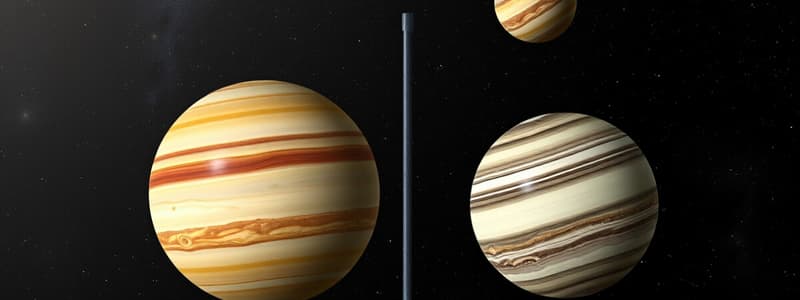Podcast
Questions and Answers
What is the unit of measurement for weight?
What is the unit of measurement for weight?
- Newtons (N) (correct)
- Pounds (lb)
- Grams (g)
- Kilograms (kg)
What remains constant regardless of location in space?
What remains constant regardless of location in space?
- Density
- Weight
- Gravitational force
- Mass (correct)
If an object has a mass of 65 kg, what is its weight on the moon?
If an object has a mass of 65 kg, what is its weight on the moon?
- 150 N
- 106 N (correct)
- 0.63 N
- 637 N
How does the gravitational force of the Earth compare to that of the moon on an object?
How does the gravitational force of the Earth compare to that of the moon on an object?
What affects the weight of an object on different celestial bodies?
What affects the weight of an object on different celestial bodies?
Flashcards are hidden until you start studying
Study Notes
Difference Between Weight and Mass
- Weight is the gravitational force exerted by a celestial body (e.g., Earth, Moon, Mars) on an object on its surface.
- Weight is measured in newtons (N).
- A person's weight varies depending on the gravitational force of the celestial body; for example, weight on Earth differs from weight on the Moon.
Understanding Mass
- Mass measures the amount of matter in an object.
- In everyday terms, mass is typically measured in grams (g) or kilograms (kg).
- Unlike weight, mass remains constant regardless of location; a mass of 65 kg on Earth is still 65 kg on the Moon or any other planet.
Weight Calculation
- On Earth, weight can be calculated by multiplying mass (in kg) by the gravitational acceleration (approximately 9.8 m/s²).
- Weight formula on Earth: Weight (N) = Mass (kg) x 9.8
- On the Moon, the gravitational acceleration is about 1.63 m/s².
- Weight formula on the Moon: Weight (N) = Mass (kg) x 1.63
Example Calculations
- For an individual with a mass of 65 kg:
- Weight on Earth: 65 kg x 9.8 = 637 N
- Weight on the Moon: 65 kg x 1.63 = 106 N
- The gravitational force exerted by Earth is considerably greater than that of the Moon.
Studying That Suits You
Use AI to generate personalized quizzes and flashcards to suit your learning preferences.




